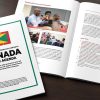
Caribbean Community (CARICOM) Reparations Commission chairman, Professor Sir Hilary Beckles said that public health was identified as one of the six areas for reparatory diplomacy and action.
KINGSTON, Jamaica, Wednesday December 11, 2013, CMC – The Caribbean Community (CARICOM) Reparations Commission has identified six key areas for priority action as it gets ready to present its first interim report to regional leaders in February next year.
Commission chairman, Professor Sir Hilary Beckles told a news conference following a meeting of the Commission with law firm, Leigh Day, earlier this week that public health was identified as one of the six areas for reparatory diplomacy and action.
“The African descended population in the Caribbean today has the highest incidence in the world of chronic diseases such as hypertension and type two diabetes,” he said, adding that this was the direct result of their nutritional exposure, endemic inhumane physical and emotional brutalization and other aspects of the stress experience of slavery and post slavery apartheid.
The Commission has also said education was another area identified with Sir Hilary stating that at the end of the colonial period, the British left the African descended population in a state of general illiteracy. He said this illiteracy continued to plague Caribbean societies and accounted for significant parts of their development challenges.
Speaking to cultural institutions, Professor Beckles said there was no development of institutions such as museums and research centers to prepare Caribbean citizens for an understanding of their history.
He spoke of cultural deprivation as another issue that needed to be addressed and outlined that the primary cultural effect of slavery was to break and eradicate African commitment to their culture.
Sir Hilary said the Commission was of the opinion that African culture had been criminalized and pointed to how Caribbean people have been affected as a result.
He said this included low ethnic self-esteem; the devaluation of black identity; broken structures and diminished family values; delegitimisation of African derived religious and cultural practices, and disconnection from ancestral roots and culture.
Psychological trauma was another area identified by the Commission that needed to be addressed, with the Commission chairman noting that during the time of slavery, Africans were classified in law as non-human, chattel, property and real estate.
He said they were denied recognition as members of the human family by laws and practices derived from the parliaments and policies of Europe. This history, he said, has inflicted massive psychological damage upon African descendants and is evident daily in social life.
The sixth issue which the Commission said needed to be remedied was that of scientific and technological backwardness. It was highlighted that for 400 years the policy of Britain and Europe had been that the Caribbean should not participate in any manufacturing or industrial process, and should be confined to the production of raw materials.
Sir Hilary said that this policy “has rendered the Caribbean a technologically and scientifically ill-equipped civilization for which it continues to experience debilitating backwardness in a science and technology globalized world”.
Additionally he said that the subjection of the Caribbean to this state has denied Caribbean youth membership and access to an enhancing science and technology culture that has become the world youth patrimony.
The Commission, which will hold its next meeting in January, re-affirmed the argument that CARICOM should request reparatory dialogue with beneficiary slave-owning European states with a view to formulating a new development agenda for the Caribbean.
A statement issued following a meeting of the executive of the Commission on Monday, noted that a call had been made for the former slave-owning nations of Europe – principally Britain, France, Spain, Portugal, the Netherlands, Norway, Sweden and Denmark – to engage Caribbean governments in reparatory dialogue to address the living legacies of these crimes.
“The Commission noted that Caribbean societies also experienced the genocide of the native population, which was also declared a crime against humanity by the United Nations. The victims of these crimes and their descendants were left in a state of social, psychological, economic and cultural deprivation and disenfranchisement that has ensured their suffering and debilitation today, and from which only reparatory action can alleviate their suffering,” the statement added












![AEO, Ras Kass, Nkechi Taifa, Kymrence Young & Tricky Trev.) (feat. Young RJ [Slum Village], Ras Kass, Nkechi Taifa & Kymrence Young)](https://ibw21.org/wp-content/uploads/2024/12/organizing-anthem-AEO-Agitate-Educate-Organize-1600x900-1-100x100.jpg)


